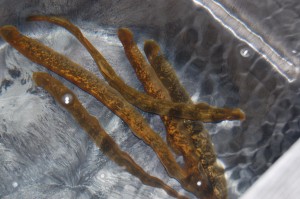Dr. Francis Collins, director of the National Institutes of Health, and chief of staff Dr. Kathy Hudson, paid a daylong visit to Emory’s Woodruff Health Sciences Center, including Yerkes National Primate Research Center, and Morehouse School of Medicine on April 14.
The purpose of Collins’ visit was to view the activities of the Atlanta Clinical and Translational Science Institute, one of 46 national CTSAs funded by the NIH through the National Center for Research Resources (NCRR). Collins also will visit CTSAs at Duke, UNC, and Vanderbilt in the future.
Collins asked that his visit focus on “how CTSAs are enabling science.†It was an opportunity for the ACTSI, a partnership among Emory, Morehouse School of Medicine, Georgia Institute of Technology and others, including Children’s Healthcare of Atlanta, Georgia Research Alliance, Georgia BIO, Kaiser Permanente, CDC, the Atlanta VA Medical Center and the Grady Health System, to showcase the unique contributions the ACTSI makes to enabling clinical and translational research.
- ACTSI
- Atlanta Clinical and Translational Science Institute
- CDC
- Children's Healthcare of Atlanta
- CTSA
- Georgia Research Alliance
- Georgia Tech
- Grady Memorial Hospital
- Morehouse School of Medicine
- National Institute of Research Resources
- National Institutes of Health
- NIH
- partnership
- Research
- translational research
- Yerkes







